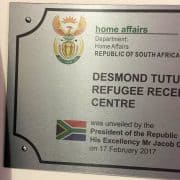|
Getting your Trinity Audio player ready...
|
For the past two years Corruption Watch, with a number of partners, has been investigating corruption in the immigration section of the Home Affairs department. Today we released our report, titled Project Lokisa: Asylum at a Price, at a gathering outside the Marabastad refugee reception office, and the picture it paints is disturbing.
We found that there are numerous opportunities for corruption in the Home Affairs refugee system, which is suffering as a result of these opportunities being exploited to the full. Our investigation included interviews with reporters, onsite visits, and a sting operation that exposed at least three operatives. We have opened criminal cases against those three implicated persons at the Johannesburg Central police station (case numbers: 934/11/16; 935/11/16 and 936/11/16).
“Corruption in the immigration process not only violates the human rights of foreign nationals genuinely seeking safe-haven from war and persecution in their home countries,” said our chairperson Mavuso Msimang, “it also opens up opportunities for economic migrants to bribe their way into the asylum system. This fuels a dangerous preconception that all foreign nationals – whether they have genuine legal protection needs or not – are taking advantage of our country’s resources.”
Download the Project Lokisa report.
Download our infographic on the asylum system.
Download our Project Lokisa video (mp4)
Corruption throughout the system
Although we’ve received 314 reports from foreign nationals about extortion, threats and solicitation from government officials since 2012, this is just the tip of the iceberg.
Irregular activities happen every day, involving Home Affairs officials at border posts and processing centres, as well as security guards, middlemen, metro police, South African Police Service officials, administrators and interpreters. The asylum seeker has to navigate a minefield strewn with those looking for personal gain, and cough up hundreds, if not thousands of rands before obtaining what is theirs by law and by right. In fact, they have to pay just to get onto the premises.
The most extensive type of corruption revealed in our reports is bribery, followed by threats of violence and deportation. “No person gets access into the gates of Home Affairs if they do not pay R100 bribe money,” a reporter told us. “If anyone has more than R100 they can jump the queue.”
The Home Affairs department states: “There is no fee payable for eligibility and status determination interviews as well as issuance or renewal of section 22, section 24 and refugee ID. Service to asylum seekers and refugees is free of charge.” But asylum seekers are stuck in a corrupt system that forces them to pay dearly for services that should cost them next to nothing.
Furthermore, of the 3.2-million individuals (stated in Global Trends: Forced Displacement, a 2015 UN High Commission for Refugees report) awaiting decisions on asylum claims globally, a staggering 34%, or 1 096 100 individuals, are in South Africa. This points to the lack of efficiency at the DHA in processing such claims.
Good laws are not enforced
Popo Mfubu, an attorney at Cape Town University’s Refugee Rights Unit, says: “South Africa has one of the most progressive and liberal asylum laws and refugee protection frameworks in the world. However, the disjuncture between law and practice has resulted in numerous points of weakness in the asylum system where corruption has been allowed to thrive.”
We’ve identified the weaknesses in the system that permit the corrupt to operate – and we have a number of suggestions on how to fix it, but it will require a concerted effort by multiple stakeholders. So far the DHA has declined to co-operate with us in addressing these issues.
Acknowledgements
Corruption Watch thanks the Prosperity Fund of the British High Commission Pretoria for its generous support of this project and report.
Our partners are:
African Diaspora Forum
Coordinating Body of Refugee and Migrant Communities<
Horizon Forensics
Jesuit Refugee Services
Lawyers for Human Rights
Legal Resources Centre
Peace Action
ProBono.org
Wits Law Clinic







